Barn’s, the popular Saudi Arabian coffee chain, has announced its plans to expand globally and aims to have 1,000 stores worldwide by 2030. The company, which was founded in 1992 by the Al Amjaad Group, currently operates over 430 stores in Saudi Arabia and is the country’s second-largest chain behind US-based Dunkin’.
In its expansion efforts, Barn’s will focus on drive-thru stores and smaller format sites, with its initial international expansion expected to target fellow Middle Eastern and North African markets. CEO of the Al Amjaad Group, Mohamed Al-Zein, also revealed that Barn’s will launch an initial public offering (IPO) this year, allowing the public to become “investors in the company’s success.”
According to the World Coffee Portal research, the Middle Eastern branded coffee shop market comprises over 8,870 outlets and is expected to reach 11,840 stores by 2027. Meanwhile, Project Café Middle East 2023 identified Saudi Arabia as the largest branded coffee shop market in the region, with a growth of 18.5% in the 12 months ending November 2022, reaching 3,556 outlets. Currently accounting for 40% of all stores in the Middle East and North Africa, the Saudi Arabian branded coffee shop market is projected to surpass 5,350 outlets by 2027.
It is not surprising that Barn’s plans to expand globally considering that their coffee is loved by many in Saudi Arabia. A recent study found that Saudi Arabia is classified among the top 10 coffee-consuming countries in the world. The consumption of coffee by Saudis is estimated at about one billion riyals annually. Saudi coffee is known globally due to the high-quality beans grown in the region. Saudi Arabia is one of the largest coffee producers in the world, producing some of the finest arabica beans. These beans are known for their rich, smooth flavor and full-bodied aroma, making them the perfect ingredient for delicious and aromatic coffee.
How Saudi coffee is made
Saudi Arabian coffee is made from coffee beans that can be roasted either lightly or heavily. The brewing methods may vary, but the typical way to make it is to boil the coffee and serve it without filtering, which makes it black. Sugar is not a common addition to coffee, but spices such as saffron, cinnamon, cardamom, or cloves may be added depending on the location in the country. The coffee is traditionally served using a pot called a dallah, which is used to pour small amounts of coffee at a time into a cup (known as a finjal). Unless instructed otherwise, your host or waiter will continue to pour small amounts of coffee into your cup. To balance the bitter taste of the coffee, it is often served with sweet treats such as dates, nuts, or candied fruit.



















